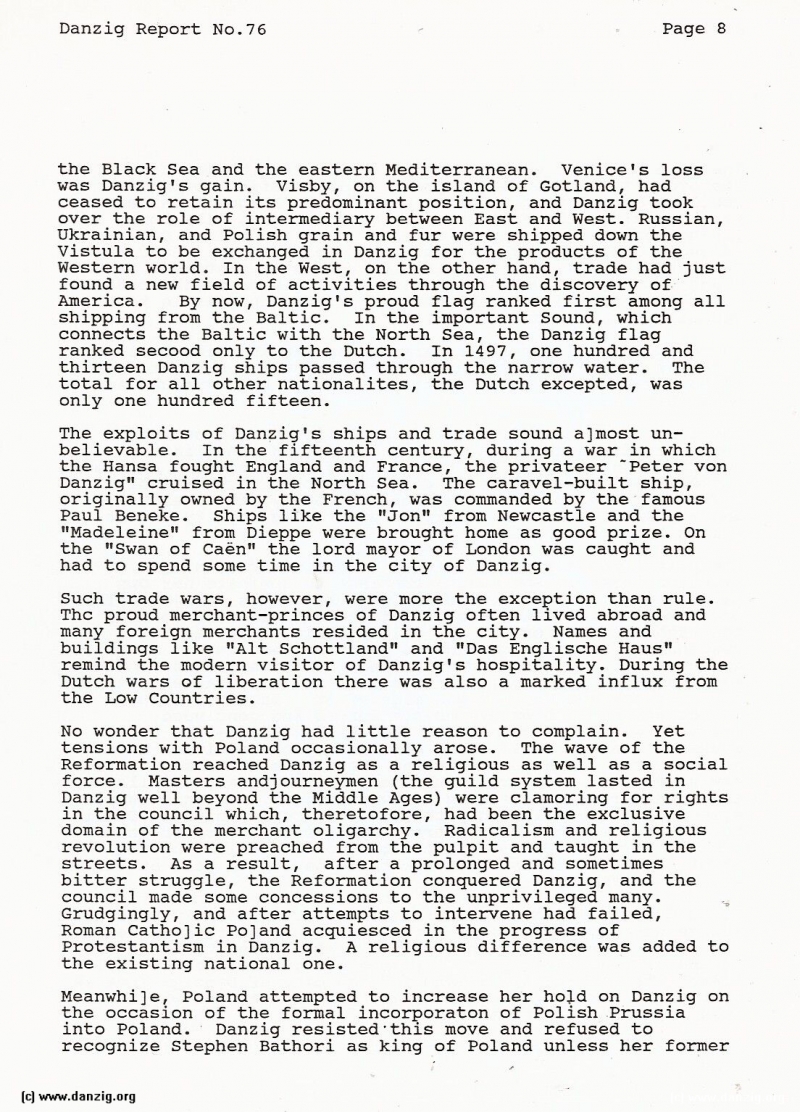
the Black Sea and the eastern Mediterranean. Venice’s loss was Danzig’s gain. Visby, on the island of Gotland, had ceased to retain its predominant position, and Danzig took over the role of intermediary between East and West. Russian, Ukrainian, and Polish grain and fur were shipped down the Vistula to be exchanged in Danzig for the products of the Western world. In the West, on the other hand, trade had just found a new field of activities through the discovery of America. By now, Danzig’s proud flag ranked first among all shipping from the Baltic. In the important Sound, which connects the Baltic with the North Sea, the Danzig flag ranked secood only to the Dutch. In 1497, one hundred and thirteen Danzig ships passed through the narrow water. The total for all other nationalites, the Dutch excepted, was only one hundred fifteen.
The exploits of Danzig’s ships and trade sound a]most unb elievable. In the fifteenth century, during a war in which the Hansa fought England and France, the privateer Peter von Danzig” cruised in the North Sea. The caravel-built ship, originally owned by the French, was commanded by the famous Paul Beneke. Ships like the “Jon” from Newcastle and the “Madeleine” from Dieppe were brought home as good prize, On the “Swan of Caén” the lord mayor of London was caught and had to spend some time in the city of Danzig.
Such trade wars, however, were more the exception than rule. Thc proud merchant—princes of Danzig often lived abroad and many foreign merchants resided in the city. Names and buildings like “Alt Schottland” and “Das Englische Haus” remind the modern visitor of Danzig’s hospitality. During the Dutch wars of liberation there was also a marked influx from the Low Countries.
No wonder that Danzig had little reason to complain. Yet tensions with Poland occasionally arose. The wave of the Reformation reached Danzig as a religious as well as a social force. Masters andjourneymen (the guild system lasted in Danzig well beyond the Middle Ages) were clamoring for rights in the council which, theretofore, had been the exclusive domain of the merchant oligarchy. Radicalism and religious revolution were preached from the pulpit and taught in the streets. As a result, after a prolonged and sometimes bitter struggle, the Reformation conquered Danzig, and the council made some concessions to the unprivileged many. Grudgingly, and after attempts to intervene had failed, Roman Cathojic Po]and acquiesced in the progress of Protestantism in Danzig. A religious difference was added to the existing national one.
Meanwhile, Poland attempted to increase her hojd on Danzig on the occasion of the formal incorporaton of Polish Prussia into Poland. Danzig resistedthis move and refused to recognize Stephen Bathori as king of Poland unless her former
Danzig Report Vol. 1 - Nr. 76 - July - August - September - 1992, Page 8.
Hits: 3561
Added: 02/07/2015
Copyright: 2025 Danzig.org

